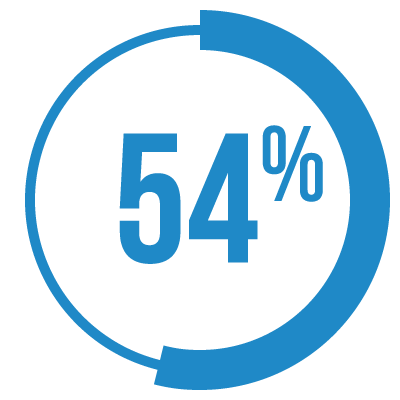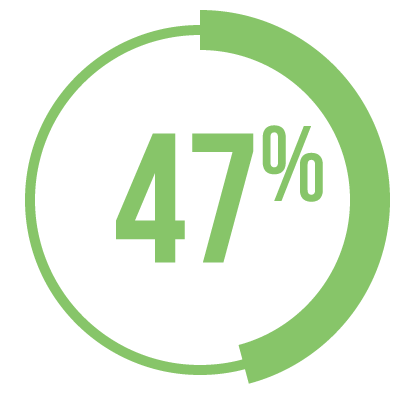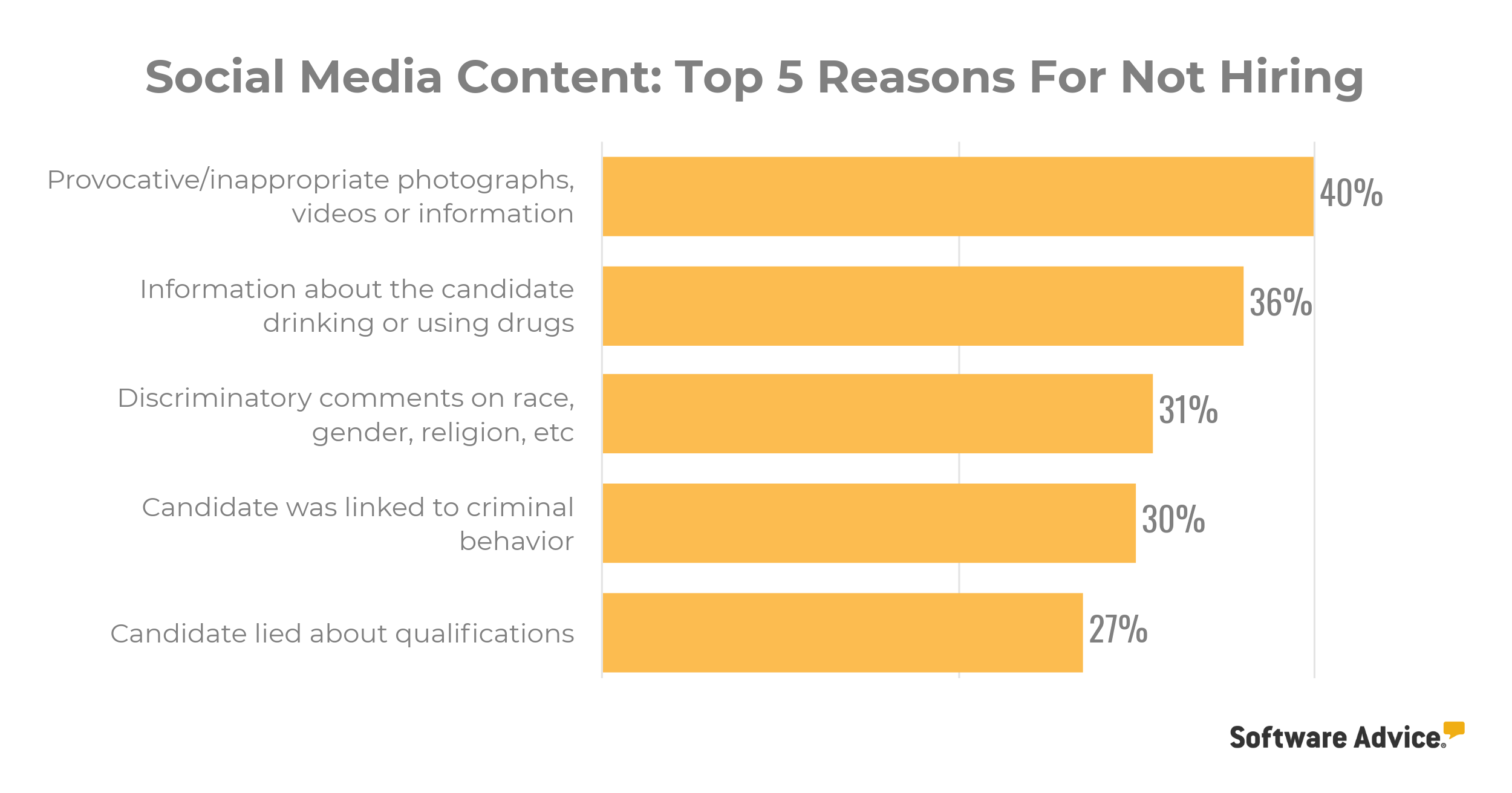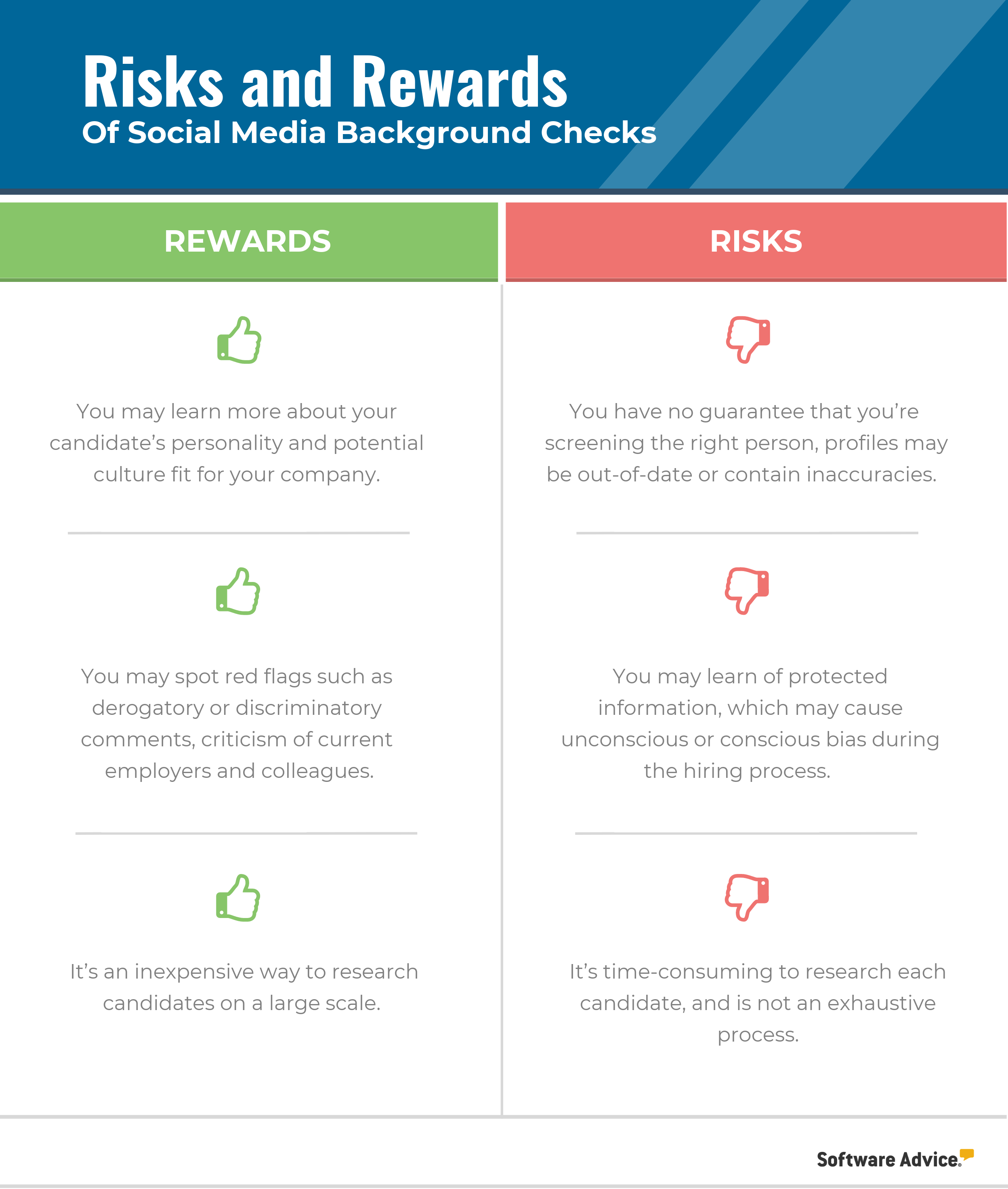Social Media Background Checks: Are You Risking a Lot for a Little?
Pre-employment background checks are the norm. We’re even moving into an era of continuous background checks during employment to ensure no red flags appear throughout an employee’s tenure.
But while we expect to be subject to some sort of background screening, do we expect potential employers to conduct social media background checks before hiring us? Well, research shows that we should—70 percent of employers are currently using social networking sites to research job candidates. What’s more, over half of those employers have used those social media background checks as a basis to reject a candidate.

of employers use social networking sites to research job candidates during the hiring process.

of employers that do social research have found content that caused them not to hire candidates.

of employers say they’re less likely to interview a candidate if they can’t find them online.
The temptation to check out a candidate’s social media presence makes sense—after all, they often provide a glance into the candidate’s “real” personality and access to potential information that supports their application. In fact, almost half of employers say that they’re less likely to even interview a candidate if they can’t find evidence of their social media profiles.
However, employers who wish to glean information from social media background checks open themselves up to multiple potential legal and discriminatory issues related to protected characteristics. Businesses that are aware of the risks of social media background checks will be much better placed to avoid them, and in turn can use these checks to their advantage.
In this article, we’ll talk about the risks versus the rewards of social media background checks and what processes employers can establish to use them safely and effectively.
Here’s what we’ll cover:
Social Recruiting Versus Social Media Background Checks
The Legality of Social Media Background Checks
The Risks Versus Rewards of Social Media Background Checks
How to Conduct Social Media Background Checks
Social Recruiting Versus Social Media Background Checks
Before we get into social media background checks, let’s establish the difference between those checks and social media recruiting. Recruiting through social media is an activity where businesses use sites such as LinkedIn, Facebook and Twitter to attract both active and passive candidates (these candidates won’t be found on job boards or other recruitment platforms).
According to recent research, talent acquisition via social media is at an all time high, with 84 percent of organizations currently using social media recruitment tactics to find viable candidates. Social media recruiting can include:
Connecting with candidates via their social profiles (Twitter direct messages, Facebook Messenger, and LinkedIn Mail).
Paid job advertising campaigns across social media sites.
Using employee advocacy strategies such as posting employee testimonials and experiences across social media.
The biggest difference between social media recruiting and social media background checks is this: You can rule out a candidate while recruiting for candidates via social media, but rejecting a candidate on the basis of information found on their social media sites once they’ve applied for the job or have been interviewed can carry legal risk, unless this is carried out properly.
The Legality of Social Media Background Checks
Social media sites can be effective for employers wanting to identify top talent, and sometimes a core part of pre-employment background screening.
Of those employers who have used social media background checks to reject candidates, their top reasons for rejection range from “provocative/inappropriate photographs, videos or information”, “discriminatory comments on race, gender, religion etc.,” to “candidate lied about their qualifications.”

Top reasons given by employers for not hiring a candidate after researching their social media profiles (Source)
However, employers need to exercise caution: there’s a huge difference between rejecting a candidate because they’ve expressed hate speech across a social media site and rejecting them on the basis of any “protected information” you find, such as gender, race, age, disability or political affiliation.
Visiting the social media pages of a candidate will almost definitely reveal this kind of information. And because everyone has hiring bias, once you’ve learned this information, it might prove difficult to claim that this information didn’t influence your decision to reject a candidate. This is especially true if the candidate in question discovers that you accessed this information.
In Nieman vs. Grange Mutual Insurance Co., the plaintiff alleged that the company had rejected him from a job after viewing the year he graduated from college on his LinkedIn profile. The court deemed that there was sufficient evidence to prove age discrimination under the Age Discrimination in Employment Act (ADEA).
Social Media Background Checks—What to Take Into Consideration:
When you carry out the social media background check is important. Do not screen candidates after inviting them for interview, as this could open up multiple legal wrangles.
At the 2018 Society for Human Resource Management (SHRM) Talent Conference, founder and CEO of Employment Screening Resources, Les Rosen, warned that, “Social media background checks need to have full Fair Credit Reporting Act (FCRA) compliance, which requires a background screening firm to maintain reasonable procedures for maximum possible accuracy.”
The Risks Versus Rewards of Social Media Background Checks
Social media background checks can be incredibly valuable to recruiters and hiring managers. By browsing candidates’ social media pages, they’re able to humanize a candidate and glean more information about their personality and character. With the importance of hiring the right employees and making sure they’re a good cultural fit, checking out how your candidate presents outside the pressure of an interview room can be a good idea.
Yet, there is no data nor any research that supports the theory that conducting social media background checks prevents bad hires or predicates good hires. Because of the uncertainties associated with carrying out social media background checks, employers risk the unnecessary loss of qualified candidates.

Employers need to be smart in how they approach social media background checks. As seen above, for every reward there’s a risk—some of which can land businesses in legal hot water.
How to Conduct Social Media Background Checks
If you decide that the pros of social media background checks outweigh the cons, there are some steps you should be taking to ensure you avoid any potential legal issues—but also to ensure you’re making the process as effective as possible. We recommend the following actions to help you conduct social media background checks:
Get consent from the candidate
As with regular background checks, it’s mandatory under the FCRA to obtain written permission for social media background checks. You must give candidates clear notice before requesting a social media report.
Use a third party to conduct social media checks
Social media background checks need to have full FCRA compliance: the same federal compliance used for regular background checks. Using a third-party company to perform these checks is the safest and most effective method, as any reputable background check company will be accredited by the FCRA.
These companies run checks on a candidates’ social media presence but scrub any protected characteristics from their final reports. Because these companies have no stake in any hiring decisions, it removes any potential bias from background checks.
Only use social media screening at the end of the hiring process
Aside from the legal risks of carrying out social media checks, there are a ton of other ways that you can assess candidates before you need to check out their personal social pages. Skills tests are a great place to start, and these are far better assessments of a candidate’s ability to do the job than social media pages.
Social media background checks should be the last step in the hiring process, and should be treated like regular background checks that are carried out as a safeguard rather than the first test of character.
Are Social Media Checks Worth the Risk?
While there’s a case for using social media background checks for gaining a more well-rounded view of your candidates, they do have their limitations. Content produced by individuals on social media pages can’t be verified, it could be inaccurate and you may even be checking the wrong person. When social media checks aren’t carried out properly, they have limited value and open up your business to a multitude of issues.
However, by following the advice in this article you can effectively use social media screening as a tool to make better hiring decisions while also staying within legal boundaries.
To learn more about background screening software options, you can reach out to our team of expert software advisors. After a short consultation, they can help you find the right solution for your business or industry. Call our advisors at (855) 998-8505 for a free consultation to narrow down your options in less than 15 minutes.
NOTE: This article is intended to inform our readers about business-related concerns in the United States. It is in no way intended to provide legal advice or to endorse a specific course of action. For advice on your specific situation, consult your legal counsel.